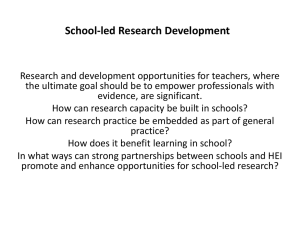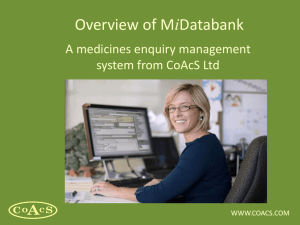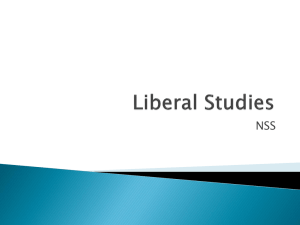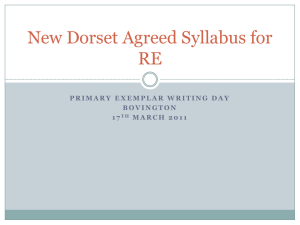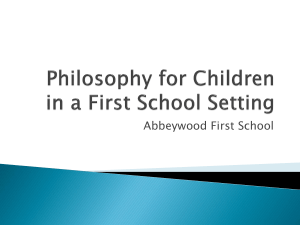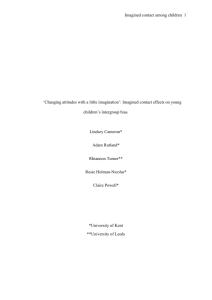imagined community - Mantle of the Expert.com
advertisement
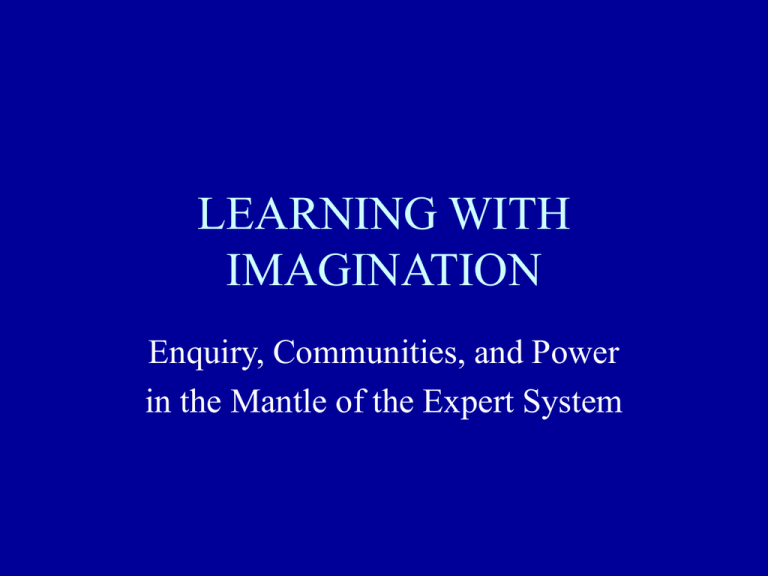
LEARNING WITH IMAGINATION Enquiry, Communities, and Power in the Mantle of the Expert System Dr. Brian Edmiston Professor of Teaching and Learning Ohio State University edmiston.1@osu.edu ‘What children ask for is … an experience of school that is engaging and meaningful, that supports the learning the children need for their adult lives in a manner that also acknowledges their priorities as children.’ (150) Devine, Dympha. (2003). Children, power and schooling: How childhood is structured in the primary school. Trentham Books ‘ … the knowledge that our students really want, and that is the knowledge we owe them [is] not merely the facts, not merely the theories, but a deep knowing of what it means to kindle the gift of life in ourselves, in others, and in the world’ Parker Palmer (1998) p. x Deep learning about life … • … you learn from people • … you can think quite a lot when you’re actually having fun at the same time • … you have to keep up with things that you don’t want to do • … [when] your imagination runs wild you can design [ideas] • …you can think of ways to make [life] better and ways that would make it worse … and about using the mantle of the expert system • • • • • … you think like an adult and how their life is … you can feel what it’s like to work … learn things you didn’t know before … it makes your mind unwind … you get to know things you would like to learn and things you wouldn’t like to learn 3 BIG IDEAS • ‘Deep knowledge’ of life comes from ENQUIRY • Enquiry happens in relationships between people in different COMMUNITIES • The type of community people create depends on how they POSITION each other and share POWER People create deep knowledge of life through ENQUIRY e.g. in a hobby • People choose to engage • in collaborative social practices • through which they explore questions of interest to them • make meaning and over time acquire the expertise (knowledge, skills, understanding) they need • to become more competent • and (ideally) ethically responsible human beings • In doing so they join and create communities of enquiry ‘Enquiry can take people beyond their current understanding of the world through collaborative explorations of the lives we want to live and the people we want to be’ Jerome Harste (2001) p. 1 Leaving pupils’ learning a deep knowledge of life (along with related facts and theories) to everyday life means leaving learning to chance … We can use the mantle of the expert system to create opportunities for learning by design An example … ‘Living with Wolves’ Y2 (Grade 1 in the U.S.) Imaginative Enquiry (or Dramatic Enquiry) in the Mantle of the Expert system Learning by design through enquiry in imagined communities • The pupils gradually take on ethical responsibility for running an enterprise in an imagined community • The pupils care enough about the long-term goals of a fictional client that they choose to engage in collaborative social practices and explore questions • In doing so the pupils (and adults) begin to imagine the world of a professional community and over time acquire expertise however … children and adults are still interacting in the everyday classroom communities EVERYDAY CLASSROOM COMMUNITIES IMAGINED COMMUNITIES The imagined expert communities become more complex and extensive over time EVERYDAY CLASSROOM COMMUNITIES IMAGINED COMMUNITIES EVERYDAY CLASSROOM COMMUNITIES IMAGINED COMMUNITIES Adults’ (and children’s) use of POWER … is not necessarily controlling, domineering, or oppressive (though it can be) People use power, in relation to other people People in classrooms have more or less power in relation to each other In your classroom, how are you (and children) able to use power? • the power to move (physical power) • the power to interact (social power) • the power to interpret and evaluate (power of ideas) Which adults and children tend to have the most/least power? • Physical power -- the power to move • Social power -- the power to interact • The power of ideas -the power to interpret/evaluate When you begin to use the mantle of the expert system … • As children begin to use power differently: to move, to interact, to interpret/evaluate How do you respond? • You (and other adults) can also use power differently: to move, to interact, to interpret/evaluate What are you comfortable trying? … children must be able to use power Children must be able to use power (to move, to interact, and to interpret/evaluate) in order to make meaning and acquire expertise • Using power to make meaning and acquire expertise Power circulates, accumulates, and disperses … Power circulates among everyone in a group in relation to everyone else Some people always have more power than others • Some people become dominant (sometimes domineering) and others can become excluded Children (and adults) use, give, take (and resist) POWER by how they POSITION other people • Power over others • Power for others • Power with others How power is used over time creates different types of COMMUNITIES • Power over others authoritative communities like factories, prisons, military, etc. • Power for others nurturing communities like families, hospices, animal care facilities etc. • Power with others collaborative communities like explorative laboratories, choirs, creative groups, investigative teams etc. What sort of community do you want in the classroom? more authoritative -- like a factory? more nurturing -- like a family? more collaborative -- like an explorative team? Whose classroom is it? Is it … • ‘my’ classroom? • ‘their’ classroom? • ‘our’ classroom? As adults … … how we use our power (and react to how children use their power) creates different types of community • The mantle of the expert system provides us with opportunities to use power differently than people usually do in the classroom Everyone uses power differently in different situations with different people People shift back and forth among • using power with • … or for • … or over other people Which uses of power are more dominant in classroom practices? • The dominant uses of power create an overall classroom ‘tone’ • Creating a tone of cooperation, collaboration, attentive listening, sharing ideas, negotiation, making meaning together i.e. sharing power with others as ‘colleagues’ is at the heart of good teaching … and is essential in successfully using the mantle of the expert system • Overall we share power with children and help children share power with one another • I can do this as ‘me’ or by positioning children as if I am someone else, like a colleague in an animal care enterprise ,or as a Park Ranger, a Bank Manager, or even a wolf This doesn’t mean we don’t use power over children, or for them • Ideally uses of power over children, and using power for them, are ‘nested’ within using power with them Power with others Power for others Power over others Nesting power relationships in a COMMUNITY of ENQUIRY • We can shift back and forth between handing over more power and holding on to or taking back more power Handing over more power Taking back more power Hand over more power Power with others Power for others Take more power Power over others Adult sharing power with children to create liberating constraints Using power with others • Children (and/or adults) position one another with broadly equal power Colleagues share knowledge and abilities … invite cooperation … collaborate in activities In order to negotiate meaning Using power with others • Use the language of ‘we’ • … and make decisions together • … including important life decisions ‘How would we be able to …?’ ‘We were wondering why …’ ‘How might we …?’ EVERYDAY CLASSROOM COMMUNITIES ‘Has anyone not had a chance to speak?’ IMAGINED COMMUNITIES ‘How will we be able to work together to capture the wolves without hurting them? Does the Ranger have any ideas? USING POWER WITH OTHERS: the language of ‘WE …’ within which is nested … Using power for others • Children (and/or adults) position themselves (and/or are positioned by others) with less power colleagues help one another and lend a hand amplify ideas bring ideas from the edge to the centre Colleagues use power for others … • Lending a hand • Bringing ideas from the edge to the centre Using power for others • Use the language of ‘you’ • … and make decisions with attention to minority as well as majority views ‘What do you need right now?’ ‘Would you like to …?’ EVERYDAY CLASSROOM COMMUNITIES ‘Would you like me to hold your drawing so everyone can see it?’ IMAGINED COMMUNITIES ‘Did you all hear what she just said about using tranquilizer darts?’ USING POWER FOR OTHERS: the language of ‘YOU…’ within which is nested Using power over others • Children (and/or adults) position themselves (and/or are positioned by others) with more power Some colleagues are ‘servant leaders’ … but colleagues don’t exclude others’ ideas Colleagues use power over others … • as ‘servant leaders’ • … but don’t exclude Using power over others • The language of ‘I …’ ‘I want to … ‘I would like you to …’ ‘I thought we had agreed to …’ EVERYDAY CLASSROOM COMMUNITIES ‘I thought we’d agreed to decide together what we’d do?’ IMAGINED COMMUNITIES ‘Wait a minute, I’m worried about how the wolves might feel if you use your hypodermic needle like that!’ USING POWER OVER OTHERS: the language of ‘I …’ Hand over more power Power with others Power for others Take more power Power over others Adult sharing power with children to create liberating constraints ‘ … the knowledge that our students really want, and that is the knowledge we owe them [is] not merely the facts, not merely the theories, but a deep knowing of what it means to kindle the gift of life in ourselves, in others, and in the world’ Parker Palmer (1998) p. x
